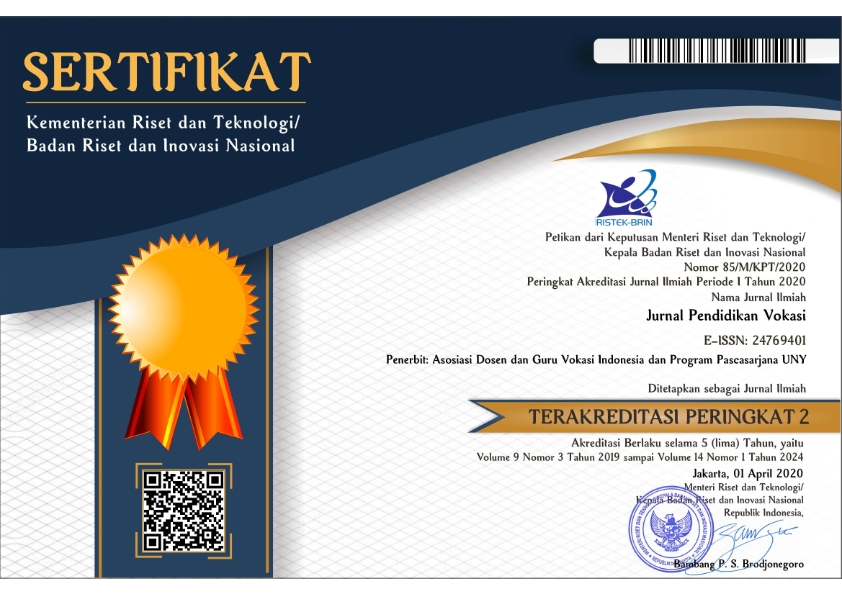Pengaruh kepribadian wirausaha, pengetahuan kewirausahaan, dan lingkungan terhadap minat berwirausaha siswa SMK
DOI:
https://doi.org/10.21831/jpv.v2i3.1039Keywords:
entrepreneurial interestAbstract
Tujuan penelitian untuk mengungkapkan pengaruh potensi kepribadian wirausaha, pengetahuan kewirausahaan, dan lingkungan keluarga terhadap minat berwirausaha. Penelitian menggunakan pendekatan ex post facto. Populasi adalah siswa SMK Rumpun Pertanian di Daerah Istimewa Yogyakarta. Sampel sebanyak 113 responden ditentukan menggunakan teknik proportional random sampling. Data dikumpulkan dengan instrumen angket dan tes. Analisis data menggunakan statistik deskriptif dan statistik inferensia. Penelitian menunjukkan minat berwirausaha relatif rendah (48,67%), potensi kepribadian wirausaha memberi pengaruh cukup berarti terhadap minat berwirausaha (27,3%), pengetahuan kewirausahaan berpengaruh berarti terhadap minat berwirausaha (13,7%), lingkungan keluarga memberi pengaruh yang berarti terhadap minat berwirausaha (22%). Terdapat pengaruh secara bersama-sama antara potensi kepribadian wirausaha, pengetahuan kewirausahaan, dan lingkungan keluarga sebesar 42,2 persen terhadap minat berwirausaha.
THE EFFECT OF ENTREPRENEUR PERSONALITY, ENTREPRENEURSHIP KNOWLEDGE, AND ENVIRONMENT ON ENTREPRENEURIAL INTEREST OF VOCATIONAL HIGH SCHOOL STUDENTS
Abstract
The Effect of Potential Entrepreneur Personality, Entrepreneurship Knowledge, and Environment on Entrepreneurial Interest of Vocational High School Students. The purposes of this research are to reveal the effect of potential entrepreneur personality, entrepreneurship knowledge, and environment on the entrepreneurial interest. This study uses the ex post facto approach. The population is Agriculture vocational high school students in Daerah Istimewa Yogyakarta. A sample of 113 respondents is established using the proportional random sampling technique. The data are collected using questionnaires and a test. The data are analyzed using descriptive statistics and statistical inference. The results show that almost half (48.67) of students have a low entrepreneurial interest. The results also show that potential entrepreneur personality gives a positive and significant effect on entrepreneurial interest (27.3%). Entrepreneurship knowledge has a significant positive effect on entrepreneurial interest (13.7%). Family environment has a significant positive effect on entrepreneurial interest (22%). The potential entrepreneur personality, entrepreneurship knowledge, and family environment collectively have the effect of 42.2 percent on the entrepreneurial interest.
References
Alma, Buchari. (2010). Kewirausahaan (edisi revisi). Bandung: CV Alfabeta.
Badan Pusat Statistik RI. (2011). Laporan Bulanan Data Sosial Ekonomi edisi Juni 2011. Jakarta: Badan Pusat Statistik.
Brown, Duane, & Brooks, Linda. (1990). Career Counseling Techniques. Boston: Allyn And Bacon.
Downey, W.D., & Erickson, S.P. (1992). Manajemen Agribisnis. (Terjemahan Rochidayat Ganda & Alfonsus Sirait). Jakarta: Penerbit Erlangga. (Buku Asli Agribusiness Management diterbitkan tahun 1987)
Hisrich, Robert D., Peters, Michael P., & Shepherd, D.A. (2005). Entrepreneurship (6th ed.). New York: The McGraw-Hill Companies Inc.
Kementrian Pendidikan Nasional. (2010). Pengembangan Pendidikan Kewirausahaan. Bahan Pelatihan: Penguatan Metodologi Pembelajaran Berdasarkan Nilai-nilai Budaya untuk Membentuk Daya Saing dan Karakter Bangsa. Jakarta: Badan Penelitian dan Pengembangan Pusat Kurikulum, Kemendiknas.
Kuratko, D.F., & Hodgetts, R.M. (2007). Entrepreneurship: Theory, Process, Practice (7th ed.). Canada: Interactive Composition Corporation.
Lambing, Peggy, & Kuehl, C.R. (2000). Entrepreneurship (2nd ed.). New Jersey: Prentice-Hall, Inc.
Linan, Francisco, & Leon, J.A.M. (2007). Entrepreneurial Intentions. Department of Apply Economy I, Universidad de Sevilla. Department of Social and Organizational Psychology. UNED.
Mappiare, Andi. (1982). Psikologi Remaja. Surabaya: Usaha Nasional.
Mardapi, Djemari. (2004). Penyusunan Tes Hasil Belajar. Yogyakarta: Universitas Negeri Yogyakarta.
"Minat Berwirausaha di Indonesia Rendah" (23 Maret 2011). Jawa Pos National Network. Diambil pada tanggal 7 Juli 2011, dari www.jpnn.com/read/2011/03/23/87627/
Saiman, Leonardus. (2009). Kewirausahaan: Teori, Praktik, dan Kasus-kasus. Jakarta: Salemba Empat.
Sarwono, Sarlito W. (2011). Psikologi Remaja (edisi revisi). Jakarta: Rajawali Pers.
Timmons, Jeffry A., & Spinelli, S., Jr. (2008). New Venture Creation: Kewirausahaan untuk Abad 21. Yogyakarta: Andi. (Buku asli New Venture Creation: Entrepreneurship for the 21st Century 6th ed.)
Downloads
Published
How to Cite
Issue
Section
License
The authors submitting a manuscript to this journal agree that, if accepted for publication, copyright publishing of the submission shall be assigned to Jurnal Pendidikan Vokasi. However, even though the journal asks for a copyright transfer, the authors retain (or are granted back) significant scholarly rights.
The copyright transfer agreement form can be downloaded here: [JPV Copyright Transfer Agreement Form]
The copyright form should be signed originally and sent to the Editorial Office through email to jpvokasi@uny.ac.id
Jurnal Pendidikan Vokasi by http://journal.uny.ac.id/index.php/jpv is licensed under a Creative Commons Attribution-ShareAlike 4.0 International License.














